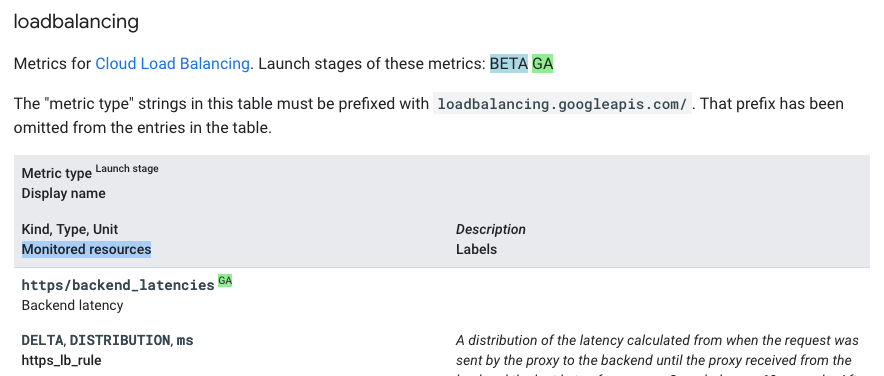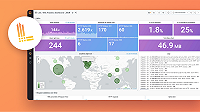Caution
Grafana Agent has reached End-of-Life (EOL) on November 1, 2025. Agent is no longer receiving vendor support and will no longer receive security or bug fixes. Current users of Agent Static mode, Agent Flow mode, and Agent Operator should proceed with migrating to Grafana Alloy. If you have already migrated to Alloy, no further action is required. Read more about why we recommend migrating to Grafana Alloy.
Important: This documentation is about an older version. It's relevant only to the release noted, many of the features and functions have been updated or replaced. Please view the current version.
gcp_exporter_config
Overview
The gcp_exporter_config block configures the gcp_exporter integration, which is an embedded version of
stackdriver_exporter. This allows for the collection of
metrics data from GCP Cloud Monitoring (formerly stackdriver).
The exporter supports all metrics available via GCP’s monitoring API. gcp_exporter follows the template stackdriver_<monitored_resource>_<metric_type_prefix>_<metric_type>.
The following example shows a load balancing metric:

The following list shows its attributes:
monitored_resource = https_lb_rule
metric_type_prefix = loadbalancing.googleapis.com/
metric_type = https/backend_latencies
These attributes result in a final metric name of:
stackdriver_https_lb_rule_loadbalancing_googleapis_com_https_backend_latencies
Authentication
Grafana Agent must be running in an environment with access to the GCP project it is scraping. The exporter uses the Google Golang Client Library, which offers a variety of ways to provide credentials. Choose the option that works best for you.
After deciding how Agent will obtain credentials, ensure the account is set up with the IAM role roles/monitoring.viewer.
Since the exporter gathers all of its data from GCP monitoring APIs, this is the only permission needed.
Configuration reference
#
# Common Integration Settings
#
# Enables the gcp_exporter integration, allowing Agent to automatically collect metrics or expose gcp metrics.
[enabled: <boolean> | default = false]
# Sets an explicit value for the instance label when the integration is self-scraped. Default is
# based on subscriptions and ResourceType being monitored.
[instance: <string>]
# Automatically collect metrics from this integration. If disabled, the exporter integration is run but not
# scraped and thus not remote-written. Metrics for the integration are exposed at
# /integrations/gcp_exporter/metrics and can be scraped by an external process.
[scrape_integration: <boolean> | default = <integrations_config.scrape_integrations>]
# How often should the metrics be collected? Defaults to
# prometheus.global.scrape_interval.
[scrape_interval: <duration> | default = <global_config.scrape_interval>]
# The timeout before considering the scrape a failure. Defaults to
# prometheus.global.scrape_timeout.
[scrape_timeout: <duration> | default = <global_config.scrape_timeout>]
# Allows for relabeling labels on the target.
relabel_configs:
[- <relabel_config> ... ]
# Relabel metrics coming from the integration, allowing series that you don't care about to be dropped
# from the integration.
metric_relabel_configs:
[ - <relabel_config> ... ]
# How frequently to truncate the WAL for this integration.
[wal_truncate_frequency: <duration> | default = "60m"]
#
# Exporter-specific configuration
#
# Required: Configure the GCP Project(s) to scrape for metrics.
project_ids:
[ - <string> ... ]
# Required: One or more values from the supported GCP Metrics(https://cloud.google.com/monitoring/api/metrics_gcp).
# These can be as targeted or loose as needed.
# Using pubsub metrics (https://cloud.google.com/monitoring/api/metrics_gcp#gcp-pubsub) as an example
# all metrics.
# - pubsub.googleapis.com/
# all snapshot specific metrics
# - pubsub.googleapis.com/snapshot
# all snapshot specific metrics and a few subscription metrics
# - pubsub.googleapis.com/snapshot
# - pubsub.googleapis.com/subscription/num_undelivered_messages
# - pubsub.googleapis.com/subscription/oldest_unacked_message_age
metrics_prefixes:
[ - <string> ... ]
# Optional: Used to further refine the resources you would like to collect metrics from.
# The structure for these filters is <targeted_metric_prefix>:<filter_query>.
# The `targeted_metric_prefix` is used to ensure the filter is only applied to the metric_prefix(es) where it makes sense.
# It does not explicitly have to match a value from `metric_prefixes` but the `targeted_metric_prefix` must be at least a
# prefix to one or more `metric_prefixes`.
# Example:
# metrics_prefixes = pubsub.googleapis.com/snapshot, pubsub.googleapis.com/subscription/num_undelivered_messages
# targeted_metric_prefix options would be:
# pubsub.googleapis.com (apply to all defined prefixes)
# pubsub.googleapis.com/snapshot (apply to only snapshot metrics)
# pubsub.googleapis.com/subscription (apply to only subscription metrics)
# pubsub.googleapis.com/subscription/num_undelivered_messages (apply to only the specific subscription metric)
# The `filter_query` is applied to a final metrics API query when querying for metric data
# You can read more about the metric API filter options in GCPs documentation https://cloud.google.com/monitoring/api/v3/filters.
# The final query sent to the metrics API already includes filters for project and metric type. Each applicable `filter_query`
# is appended to the query with an AND.
extra_filters:
[ - <string> ... ]
# Optional: The time range used when querying for metrics.
# Most of the time the default works perfectly fine. Most documented metrics include a comments of the form
# `Sampled every X seconds. After sampling, data is not visible for up to Y seconds.`
# As longs as your `request_interval` is >= `Y` you should have no issues.
# Consider using `ingest_delay` if you would like this to be done programmatically or are gathering slower moving metrics.
[request_interval: <duration> | default = "5m"]
# Optional: When enabled this automatically adjusts the time range used when querying for metrics backwards based on
# the metadata GCP has published for how long the data can take to be ingested. You can see the values for this in
# documented metrics as `After sampling, data is not visible for up to Y seconds.`
# Since GCPs ingestion delay is an "at worst," this is off by default to ensure data is gathered as soon as it's available.
[ingest_delay: <boolean> | default = false]
# Optional: When enabled this offsets the time range used when querying for metrics by a set amount.
[request_offset: <duration> | default = "0s"]
# Optional: When enabled drops metrics from attached projects and only fetches metrics from the explicitly configured `project_ids`.
[drop_delegated_projects: <boolean> | default = false]
# Optional: Sets a timeout on the client used to make API calls to GCP. A single scrape can initiate numerous calls to
# GCP, so be mindful if you choose to override this value.
[gcp_client_timeout: <duration> | default = "15s"]Configuration Examples
The following examples show working configurations. See the Configuration Reference for a full overview of the configuration options and what they do.
Multiple prefixes
gcp_exporter:
enabled: true
project_ids:
- <project_id>
metrics_prefixes:
- run.googleapis.com/
- cloudfunctions.googleapis.com/
- compute.googleapis.com/nat
- logging.googleapis.com/billing
- logging.googleapis.com/exports
- serviceruntime.googleapis.com/quota/
- storage.googleapis.com/
- pubsub.googleapis.com/subscriptionLoad balancing with a filter
gcp_exporter:
enabled: true
project_ids:
- <project_id>
metrics_prefixes:
- loadbalancing.googleapis.com
extra_filters:
- loadbalancing.googleapis.com:resource.labels.backend_target_name="sample-value"Subset of load balancing metrics with a filter
gcp_exporter:
enabled: true
project_ids:
- <project_id>
metrics_prefixes:
- loadbalancing.googleapis.com/https/request_bytes_count
- loadbalancing.googleapis.com/https/total_latencies
extra_filters:
- loadbalancing.googleapis.com:resource.labels.backend_target_name="sample-value"


